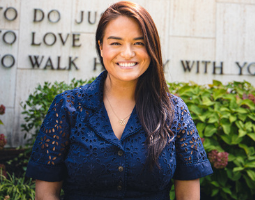A D’var Torah by Rabbi Becky Jaye for Parshat Miketz
We do not often align ourselves with the pharaohs of the Bible, yet I find the pharaoh of the Joseph narrative a stunning model of proactivity and prevention in the context of communal activism.
At the beginning of Parshat Miketz, we read of the well-known dreams that wake Pharaoh in a blanket of sweat and confusion. First, he dreams he is standing at the Nile, privy to the sight of seven fat and handsome cows grazing on the luscious green beside the moving waters. However, shortly thereafter, the pleasing image of these cows grazing in a land of plenty becomes juxtaposed with the swift appearance of their mirrored opposites: seven other cows, “gaunt and repulsive.” And in what many assume to be a jarring and shocking vision, those seven emaciated cows quickly consume their fuller counterparts, succumbing to the starvation that ravages their bodies.
Presumably startled by such a sight, Pharaoh quickly awakes, as one often does when the quietude of sleep is punctured by an unfamiliar and frightening dream. Yet despite having soothed his mind back to a peaceful slumber, he dreamt yet again of a similar phenomenon: Seven ears of corn before him, healthy and ripe, are quickly swallowed by their thin, scorched counterparts. Our Torah states, “In the morning, his spirit was troubled; he put out a call for all the soothsayer-priests and sages of Egypt; Pharoah related his dream to them, but no one could interpret them for Pharaoh.” (Genesis 41:1-8)
Sign up to receive (M)oral Torah in your inbox each week.
It is these dreams that become a catalyst for the rest of the Joseph narrative, during which Joseph is released from prison to advise Pharaoh of their meaning. He becomes a trusted advisor to the Pharaoh and is eventually placed “in charge of the entire land of Egypt.” (Genesis 41:41) From there, we as readers can follow Joseph reuniting with his family, and in an unusual thematic spin, read of a happy ending to the Joseph narrative.
Pharaoh’s dreams are awful, but he does not allow himself to remain in a state of emotional paralysis. He acts. Moreover, he accepts advice from among the most marginalized in his kingdom: a foreigner, a prisoner, a slave. And when Joseph’s words ring true for him, he does not hesitate to put power and authority in Joseph’s hands.
Unlike the pharaoh of Joseph’s world, we live now in a time and place where our fears for humanity’s future do not solely exist in our hearts and minds; the nightmares of now do not come from nowhere, but are predictions of the future that can be reliably foretold by advances in science, statistics, and technology. And yet the dreams of Pharaoh then are not far from the dreams that plague our minds now: Cows devouring cows and corn swallowing corn have transformed to humanity consuming itself.
Find more commentaries on Parshat Miketz.
We see this, and know this, when it comes to issues of climate change and a crumbling environment, the effects of generational trauma upon different communities’ physiological and mental health, and the systemic forces of oppression that inhibit minority groups from social and economic advancement in future generations. We look to the future with reluctance, despair, and fear; or at least, I certainly do.
Rashi adds a comment that offers an extra dimension of Pharaoh’s dreams. On the thin cows devouring the healthy ones (41:4), he writes, “This was a sign that all the joy of the years of plenty would be forgotten in the years of famine.” That is to say, there are two dimensions to the risks we face. The first, of course, is the actual crisis at hand — climate change, racism, and so on. The second is our emotional and spiritual state in response. If we allow fear and despair to paralyze us, we lose all ability to respond to the crisis, which digs us deeper into a destructive cycle.
But if, like this Pharaoh, we can move beyond the terror to seeking options with an open mind, we may find ourselves with more resources at hand than we ever realized was possible.
Rabbi Becky Jaye is Program Manager of Emor, T’ruah’s new public thought leadership institute.

